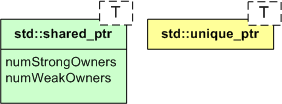No Runtime Overhead -- Bulldozer00
 A little nugget about the free-as-in-no-overhead-ness of
A little nugget about the free-as-in-no-overhead-ness of unique_ptr and std::move:
No Runtime Overhead
by Bulldozer00
From the article:
Unless I really need shared ownership of a dynamically allocated object, which I haven’t so far, I stick to the slimmer and more performant
std::unique_ptr. ...

 In this article, Eric Niebler discusses an issue of API design regarding the age-old question of out parameters versus return-by-value, this time in light of move semantics. He uses
In this article, Eric Niebler discusses an issue of API design regarding the age-old question of out parameters versus return-by-value, this time in light of move semantics. He uses  Jeff Preshing gives a nice overview of the on-again/off-again/on-again status of a common approach to lazy initialization.
Jeff Preshing gives a nice overview of the on-again/off-again/on-again status of a common approach to lazy initialization.